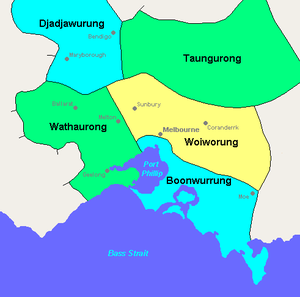Kulin languages
From Wikipedia, the free encyclopedia
| Kulin | |
|---|---|
| Ethnicity: | Kulin |
| Geographic distribution: | Victoria |
| Linguistic classification: |
Pama–Nyungan
|
| Subdivisions: |
|
 The five Kulin nations | |
The Kulin languages are a group of closely related languages of the Kulin people, part of the Kulinic branch of Pama–Nyungan.
Languages
- Woiwurrung (Wuy-wurrung): spoken from Mount Baw Baw in the east to Mount Macedon, Sunbury and Gisborne in the west. The Wurrundjeri-willam were a clan who occupied the Yarra River and its tributaries. Referred to initially by Europeans as the Yarra Yarra tribe. Other Woiwurrung clans include the Marin-Bulluk, Kurung-Jang-Bulluk, Wurundjeri-Balluk, Balluk-willam. Wurundjeri is now the common term for descendants of all the Woiwurrung clans.
- Bunurong (Bun-wurrung): spoken by six clans along the coast from the Werribee River, across the Mornington Peninsula, Western Port Bay to Wilsons Promontory. Referred to by Europeans as the Western Port or Port Philip tribe. The Yalukit-willam clan occupied the thin coastal strip from Werribee, to Williamstown. Bunurong is now the common term for all the people of this language group.
- Daungwurrung (Dhagung-wurrung): spoken north of the Great Dividing Range in the Goulburn River Valley around Mansfield, Benalla and Heathcote. Referred to by Europeans as the Goulburn River tribe. Taungurong is now the common term for all the people of this language group.[1]
- Wathaurong (Wadha-wurrung): spoken by 15 clans south of the Werribee River and the Bellarine Peninsula to Streatham. Referred to by Europeans as the Barrabool people. The escaped convict, William Buckley lived with this community for 32 years, between 1803 and 1835, before being found by John Batman on 6 July 1835.
- Djadjawurrung (Ngurai-illam-wurrung): spoken by the 16 clans of the Jaara or Dja Dja Wurrung people around Murchison, the central highlands region, east to Kyneton, west to the Pyrenees, north to Boort and south to the Great Dividing Range. Referred to by Europeans as the Broken River tribe or Loddon Aborigines.
Kulin, or perhaps Kulinic:
- Madhi-Madhi (Muthimuthi), Ledji-Ledji, and Wadi-Wadi share 80% of vocabulary, suggesting they might have formed a group.
- Wemba-Wemba (Baraba-Baraba, Nari-Nari)
Bowern (2011) lists all of these apart from Daungwurrung and Baraba-Baraba, and adds Tjapwurrung (Jab-wurrung) as a distinct language. Binjali was a dialect of an unidentified western Kulin language.[2]
Classification
Dixon (2002) accepts the Kulin languages as a family, and sees them as forming three languages:[3]
- Wuy-wurrung, including Wuy-wurrung, Bun-wurrung, and Dhagung-wurrung dialects (the first three entries above)
- Wadha-wurrung (Wuddyawurru, Witouro)
- Wemba-Wemba, including Jaja-wurrung, Madhi-Madhi, Ladji-Ladji, Wadi-Wadi, Nari-Nari, Wemba-Wemba, Baraba-Baraba, Wergaya, Djadjala, Wutjabulak, Martijali, Buibatyalli, Nundatyalli, Jab-wurrung, and Pirt-Koopen-Noot dialects
References
- ↑ Richard Broome, pp123-125, Aboriginal Victorians: A History Since 1800, Allen & Unwin, 2005, ISBN 1-74114-569-4, ISBN 978-1-74114-569-4
- ↑ Binjali at AIATSIS
- ↑ Dixon, R. M. W. (2002). Australian Languages: Their Nature and Development. Cambridge University Press. p. xxxv.
This article is issued from Wikipedia. The text is available under the Creative Commons Attribution/Share Alike; additional terms may apply for the media files.